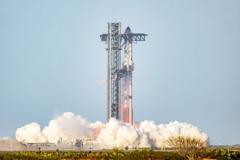Elon Musk has revealed plans for SpaceX’s Starship rocket to commence its inaugural mission to Mars by the end of next year, despite facing significant challenges during recent flight tests. In a post on X, Musk expressed optimism about potential human landings occurring as early as 2029, although he admitted that 2031 seemed like a more probable timeline.
The Starship, towering at 123 meters, is central to Musk's vision of colonizing Mars. However, it has encountered multiple setbacks, including a recent mission in which one rocket exploded mere minutes post-launch in Texas, marking the second failure this year due to what SpaceX termed a “rapid unscheduled disassembly.”
After these incidents, debris was noted falling into the Bahamas, prompting SpaceX to initiate a data review to determine the underlying causes of these explosions. The Federal Aviation Administration (FAA) stipulated that SpaceX must conduct a thorough investigation before it can proceed with any additional flights.
Musk's ambitious ambitions extend beyond Mars, as he intends for a modified version of the Starship to serve as a lunar lander for NASA’s Artemis missions, facilitating human return trips to the Moon.
The first Mars mission is expected to carry the Tesla humanoid robot "Optimus," which Musk showcased last year. He envisions that this robot will one day accomplish various daily tasks, with a projected cost ranging between $20,000 and $30,000.
Recently, SpaceX also launched a Falcon 9 rocket, transporting a crew to the International Space Station (ISS) as part of plans to return two astronauts home. Butch Wilmore and Suni Williams anticipated an eight-day stay but ended up remaining aboard for over nine months due to technical difficulties with their spacecraft, which was developed by Boeing.

















